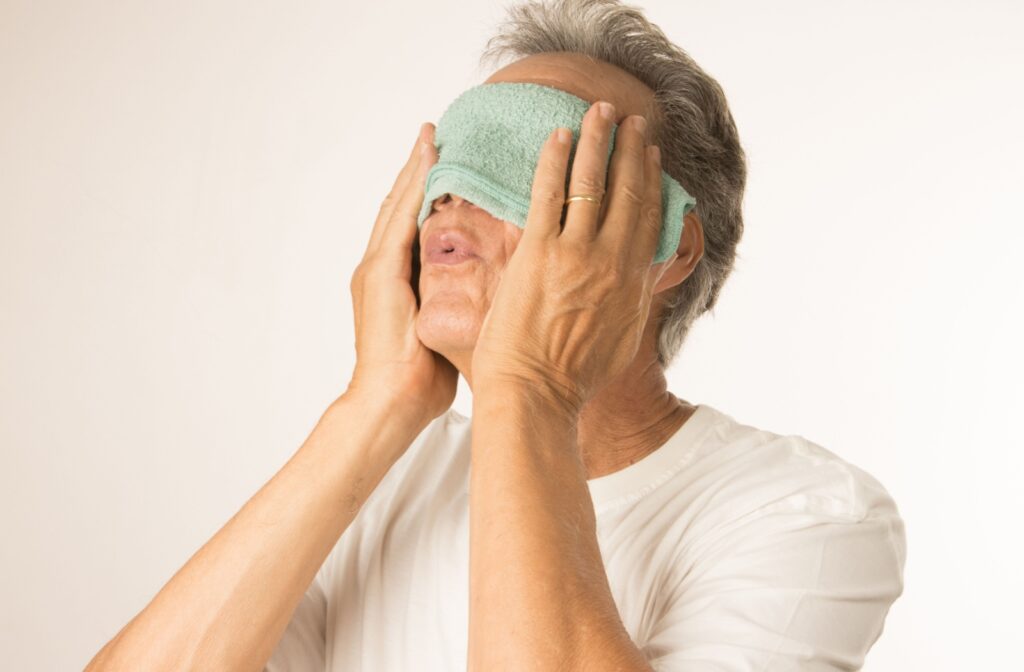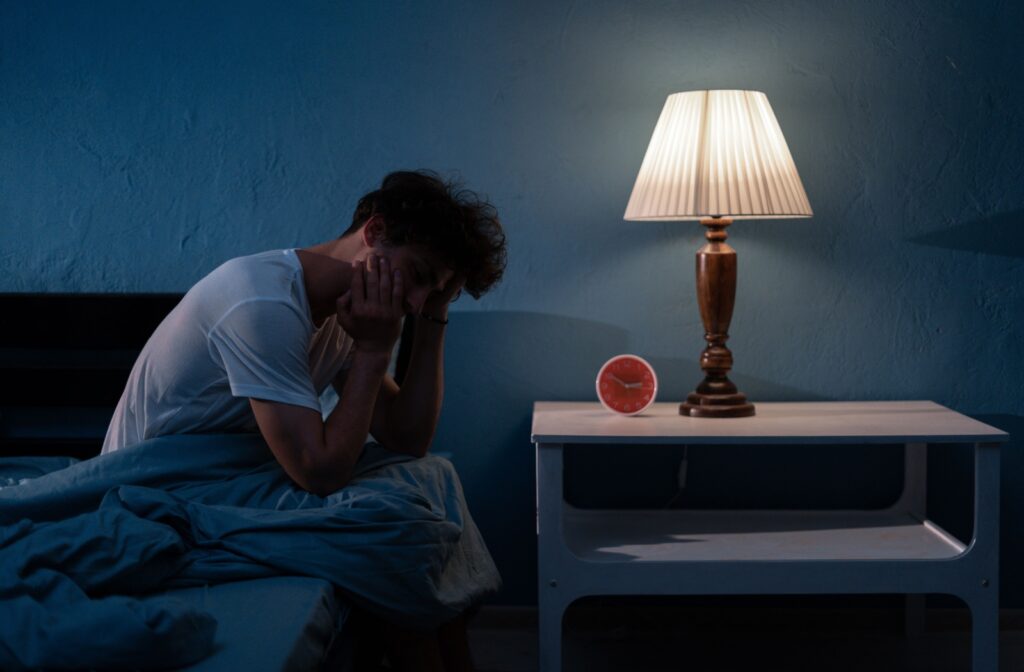Sleep is crucial for overall health, and its impact on eye health is often overlooked. Waking up to blurry vision can negatively impact your morning and quality of life.
Waking up with blurry vision due to lack of adequate sleep may be caused by dry eyes.
For individuals who receive good sleep, blurry vision in the morning may be related to incomplete lid closure, digital eye strain, or dry eye symptoms that are exacerbated due to reduced tear production.
What Is Dry Eye Disease?
Dry eye disease is a common eye condition that affects around 16 million Americans. While it’s not a serious condition, leaving dry eyes unmanaged can lead to blurry vision, discomfort, and irritation, impacting overall quality of life.
Dry eyes occur when your eyes don’t produce enough tears to keep them hydrated or when tears evaporate too quickly, leading to irritation, inflammation, and sometimes damage to the eye’s surface.
There are two main types of Dry eye disease:
- Aqueous Tear-Deficient Dry Eye: The eyes don’t produce enough tear fluid to maintain a healthy eye surface.
- Evaporative Dry Eye: This is the most common form of dry eye and occurs when tears evaporate too quickly due to an imbalance in tear composition.
Dry eyes can develop from several causes, including inadequate sleep, incomplete lid closure, and prolonged screen use before bed leading to symptoms like blurry vision, eye strain, and redness or irritation.
The Link Between Sleep & Vision Clarity
Like the rest of the body, sleep is important for maintaining eye health. During sleep, the eyes undergo several restorative processes, one of which involves the tear film.
During sleep, the tear film, responsible for keeping the eye hydrated and moisturized, replenishes, which is an important structure for maintaining clear vision. When sleep is compromised this replenishment process is disrupted, leading to dry eyes and blurry vision.
In other words, dry eye disease, or rather the lack of this condition, is the link between sleep and vision clarity. Adults should get 7 to 9 hours of sleep per night for optimal health and functioning. When they don’t, the tear film cannot replenish. The eyes cannot be adequately hydrated, leading to dryness, discomfort, and blurry vision.
Tear production naturally decreases during sleep because our body goes through various cycles of deep and light sleep. For most people, this doesn’t cause any problems, but if you already have dry eye syndrome, this reduction in tear production can exacerbate symptoms overnight.
Sleep-deprived eyes struggle to focus properly, causing temporary vision problems. Over time, chronic sleep deprivation can aggravate these issues, making them harder to reverse.
Sleep-Related Factors Resulting in Dry Eyes
Even if you’re receiving an adequate amount of sleep, waking up with dry eyes and blurry vision could be a sign of nocturnal lagophthalmos, also known as incomplete lid closure. If your eyelids don’t fully close during sleep, the tear film covering the eye can evaporate more rapidly than it is replenished, leading to dryness.
Although not directly related to sleeping, heavy use of digital devices before bedtime can lead to digital eye strain and reduced blinking, which can diminish the tear film’s quality before sleep. This may not provide sufficient moisture to comfortably last through the night.
Dry eyes and blurry vision aside, chronic sleep deprivation can lead to several eye issues including:
- Eye strain
- Light sensitivity
- Itchy eyes
- Twitchy eyelids
Long-term sleep deprivation that remains unmanaged has been linked to a higher risk of developing eye conditions like:
- Myopia
- Glaucoma
- Diabetic eye problems

Treatment & Prevention for Dry Eyes
Lifestyle Adjustments
Routine and consistency in sleep patterns can help prevent the onset of dry eyes. Making significant changes in your sleep habits includes maintaining a regular sleep schedule, creating a restful environment, avoiding caffeine and heavy meals before bed, and minimizing screen time.
Simple lifestyle adjustments can go a long way in preserving vision clarity and preventing serious eye conditions.
Visiting Your Optometrist
Understanding the underlying cause of your dry eyes is important for effective management. Visiting your optometrist for a thorough examination can help develop a dry eye therapy plan most suitable for your ocular needs.
Over-the-Counter Options
Alleviating dry eyes is important for managing blurry vision due to lack of sleep. Fortunately, several over-the-counter options are available and can be used before bed to reduce symptoms of dry eyes when used in conjunction with good sleep habits.
- Artificial Tears: Use preservative-free artificial tears to help lubricate the eyes before bed or in the morning if needed. If you’re using both artificial tears and an eye ointment to provide dry eye relief before bed, use the artificial tears first and wait at least 10 minutes before applying the ointment to prevent the eye drops from washing away some of the ointment.
- Eye Ointment: Apply a preservative-free eye ointment to the lash line before bedtime to help retain moisture and prevent dryness throughout the night. The ointment is thick like a cream and will make your vision slightly blurry making it a good option to use before sleeping.
- Warm Compress: Apply a warm compress over your closed eyelids and gently massage around the area for a few minutes before going to bed to help stimulate tear production and alleviate dryness.
While these measures can provide temporary relief, the best remedy for blurry vision due to lack of sleep is to ensure you get adequate rest. If blurry vision persists, it is advisable to visit your optometrist for a thorough eye examination to rule out any underlying factors such as refractive errors.
Schedule an Appointment
Understanding the connection between sleep and vision clarity, implementing a manageable sleep routine, and using over-the-counter solutions for dry eyes can help alleviate blurry vision in the morning.
Connect with our team at Total Vision Talega to schedule a dry eye consultation.



